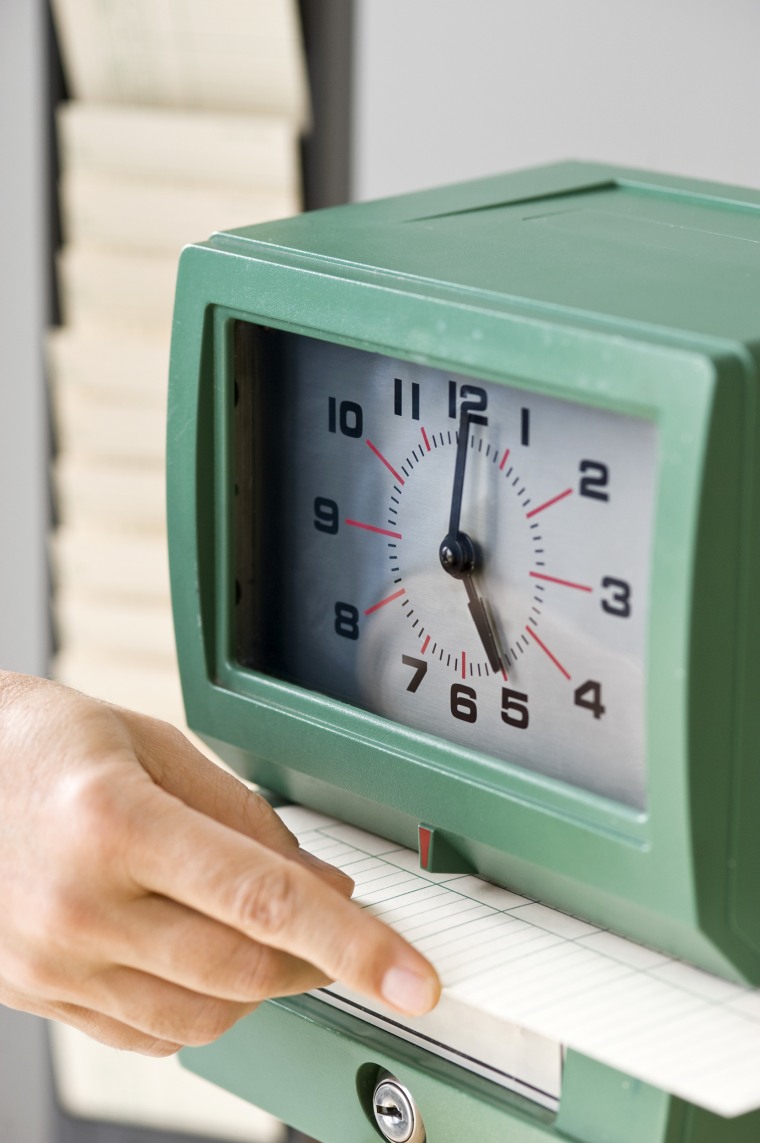You know how much that new TV costs, but how many hours will you work to pay for it?
That’s the question you should ask before swiping your credit card, according to MoneyNing founder David Ning. The financial guru said he uses a simple equation to discourage splurging: Divide the cost of a potential purchase by your hourly wage to determine whether it’s worth the work.
Cost of item / hourly wage = hours you’ll work to pay for it
According to Ning’s observations, $39.99 is what a lot of people spend on everyday purchases.
“If you get numb [to buying things] and $40 seems like nothing, but you’re making $10 an hour, you really have to work four hours just to make that money,” Ning told NBC News BETTER.
What's the best thing money can buy according to Ning? Freedom.
Salaried workers will need to do a little more math to figure out this equation, he said. For example, a person making $60,000 a year, after paycheck deductions, is probably making around $20 an hour, he said.
“So even if you make $60,000, that $40 purchase is still going to cost you two full hours,’” he said. “When you think about it that way, a lot of people are like, ‘Whoa, maybe that $40 isn’t really worth it.’”
Recurring purchases add up
Ning said most people don’t consider the amount they spend on recurring purchases, or the number of hours they work to pay for them.
“Something like cable TV is $100 every month,” he said. “So again going back to the $60,000 salary person — [which is] $20 an hour — you’re working 5 hours just for that TV subscription,” he said.
Recurring expenses are expenses people typically “just don’t think about,” he added, especially if the expense is automatically charged to a credit card.
Consider the true value of what you buy
Ning said he was raised with an understanding that frugality is a way of life. The son of Chinese immigrants who got by on little, the blogger doesn’t place much value on consumer goods. He said most products don’t have much value when you consider the amount of time it takes to work for them.
“For me personally, I need to see long-term value,” said Ning. He prefers spending his money on experiences, like family trips and vacations.
RELATED: The Ridiculously Simple Way to Save Money: Envelopes
“Experience is better than getting more stuff because when we buy stuff pretty much all the time after we use it once or twice after the initial hoopla kind of wears off, we’re just stuck there, toss it aside and there’s another thing we have to keep track of. And we don’t ever use it anymore,” he said. “But with experiences at least, we can cherish the memories and we get the value again and again.”
It’s all too easy for consumers to get tricked by marketers into thinking they need to buy new things to be satisfied, he warned.
“The marketing kind of plays into our psychology,” he said. “They tell us that it’s better, and in some ways, it is better. The house is bigger, the car has got the new car smell, runs better, looks nicer, and all that is true. But then [people] don’t think about how much it’s costing them.”

The more you save, the less you have to work
The 37-year-old worked in finance and IT for seven years before launching his financial blog in 2007, which he now runs full time.
“Most people work because they need the money or they want more money, but if they have the money already then they don’t have to work as much,” Ning said.
What’s the best thing money can buy according to Ning? Freedom.
“There’s like time-freedom and there’s also the peace-of-mind-type freedom,” he explained.
When you spend less on stuff, and save your money, you know you have a rainy day fund that brings you peace of mind, Ning said.
“If you’re really unhappy at work and you want a change, it kind of takes some savings in order to have the courage to say ‘no’ to your boss, and all that is freedom,” he explained.
“For a lot of people, if they really think about it, using money to buy that kind of freedom is way more important than getting that shiny new car again and again,” Ning concluded.
How to Decide if a Purchase is Worth the Work
- Divide the cost of a potential purchase by your hourly wage to determine the number of hours you’ll work to pay for it (Cost of item / hourly wage = hours you’ll work to pay for it). Ask yourself: Is it worth it?
- Use this calculation to determine if you are working too much to pay for recurring purchases, like cable and cell phone bills.
- Consider the value of what you’re buying.
- Money can buy freedom. The more you save, the more independence you have.

